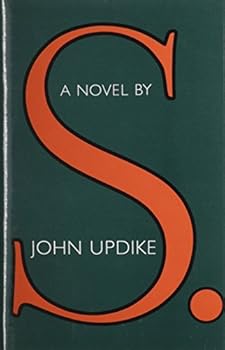S
Select Format
Select Condition 
Book Overview
S. is Sarah Worth -- doctor's wife, North Shore matron, loving mother, and now (suddenly!) ardent follower of a Hindu religious leader known as the Arhat. As this brilliant and very funny novel opens,... This description may be from another edition of this product.
Format:Hardcover
Language:English
ISBN:0394568354
ISBN13:9780394568355
Release Date:February 1988
Publisher:Alfred A. Knopf
Length:288 Pages
Weight:1.05 lbs.
Dimensions:8.3" x 1.1" x 5.5"
Customer Reviews
5 ratings
A woman of independent means
Published by Thriftbooks.com User , 20 years ago
Written in the form of letters, Updike in this novel satirizes the excesses of the materialistic world while showing that a woman can overcome these excesses (that she is a part of) and make a totally different life for herself. Sarah Worth divorces her wealthy husband and joins a Hindu ashram in the southwest. In her letters to friends and family she reflects on her past, especially what she had to do (the style rituals, healthy skin potions she lathered herself with, the importance of being her rich husband's trophy wife) as it compares to her simpler life in the ashram. But all is not rosy there, either, as it too roils in its own hypocrisies as it generally rips off the people who go there. Sarah rises up against this and runs off with their illegal funds. She escapes her naivety, though the townspeople in which the ashram is located are upset with her actions and are still blinded by their gullibility. Updike wrote this novel in response to the charge that he had never written about a "strong" woman. Sarah Worth (ah, the importance of names) is a "worthy" answer to this accusation. This book, as others by Updike, has a strong connection to Hawthorne's SCARLET LETTER.
Funniest Updike
Published by Thriftbooks.com User , 22 years ago
Updike has this amazing ability to turn his hand to anything. There is no distinct Updike style you could ever parody. He just writes amazingly well. He can put himself inside the skin of anyone of of any ethnicity or sex. His tone rends to be satirical but he can be profound. This is one of his most undiluted attempts at out and out comedy. It is written from the point of view of a very WASP New England lady (one of her ancestors is a Prynne, and her daughter is called Pearl) who deserts her adulterous doctor husband to join a Hindu or Buddhist (I was never quite sure which) commune in Arizona.It's written in the form of the letters and tapes she sends to correspodents back East (her dentist, hairdresser, husband, psychotherapist, daughter,best friend, lawyer, hairdresser's jailed son etc). She starts off as a naive dupe, but by the end has oth cleverly outsmarted everyone who tried to rip her off and achieved the spiritual development she sought from the fraudulent guru.
Updike on religious humor and the female condition
Published by Thriftbooks.com User , 23 years ago
S. is the story of Sarah Worth, a New England matron who flees the confines of midcentury feminine affluence to seek spiritual (and sexual) enlightenment in a religious commune. She chronicles her adventure in letters to her best friend, daughter, and estranged husband, as well as short notes to her former dentist and hairdresser, tapes of conversations with the commune's leader, and a selection of the letters she writes on behalf of the commune's business office. The story unfolds briskly and subtely, with Updike employing his satirical skill to show a woman who, in leaving her life behind, manages to take it all with her.A benefit of the letter format is that it allows a full exploration of the narrator's voice, to excellent effect. It also suppresses Updike's tendency to rely too heavily on his (excellent) descriptive language and instroduces an element of suspense that makes the story quite absorbing.S. has been criticized by other reviewers for its perceived mockery of Eastern religions, but I don't think this is intended. Updike has obviously done extensive research - if not into Eastern religions themselves, then at least into their Western offshoots - and presents the characters with what, for him, is considerable sympathy. Of course he mocks the narrator's blind devotion to the commune - that's part of what the book is about - but he's mocking the misdirection of her efforts, not the ideals to which she aspires. The one element of the book that frustrated me was Updike's treatment of his narrator. Sure, it's fun to read a book about an arrogant and slightly hysterical woman who is always just slightly out of her league - a Bridget Jones for our mothers' generation. But it would perhaps be more interesting to watch a character really grow through the course of the novel and transcend, or at least recognize, her own bias. Of course that kind of revelatory change would be anathema to Updike, whose thesis - popping up, appropriately, in book after book - seems to be that life is a cycle, endlessly revolving, lush with beauty and without escape. And this book is - first and foremost, like all his books - Updike.
This book reads like my mother talks
Published by Thriftbooks.com User , 27 years ago
I thought Updike really captured the stream-of-consciousness way of speaking of a lot of women (my mom has this tendency). It was hilarious to read about this woman leaving behind all the trivia of everyday life in favor of spiritual enlightenment but still clinging tight to her old world. This was a really good book. Great plot twist at the end.
S. for super hilarious
Published by Thriftbooks.com User , 28 years ago
John Updike does an excellent job changing his style from dark to light with dark undetones in this book. It was so incredibly funny that I laughed out loud while reading it. It is a quick read with some good insights into changing your life for better or worse.






